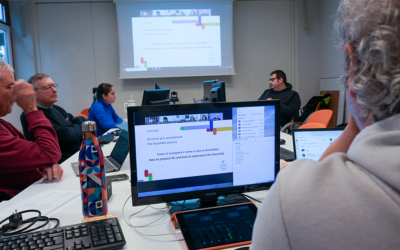 With its project Petite Flamme, the Focolare Movement in the Democratic Republic of the Congo is making its contribution to resolving one of the most serious problems of the country: the extreme need for medical care, education and wholesome nutrition for countless children. Petite Fiamme officially began three years later in N’dolo, one of the quarters of Kinshasa where there is a military camp for 750 families in need. Two kindergartens were begun, and then a third one in the Masina quarter. Many of the children were the sons and daughters of military families.
With its project Petite Flamme, the Focolare Movement in the Democratic Republic of the Congo is making its contribution to resolving one of the most serious problems of the country: the extreme need for medical care, education and wholesome nutrition for countless children. Petite Fiamme officially began three years later in N’dolo, one of the quarters of Kinshasa where there is a military camp for 750 families in need. Two kindergartens were begun, and then a third one in the Masina quarter. Many of the children were the sons and daughters of military families.  The first objective was to offer academic instruction, but it immediately became obvious that the children were suffering malnutrition. They began to provide one meal a day and medical care. In the years that followed, Petite Flamme opened new centers, expanded the school year and extended its services to pre-teens, teens and to families. In 2002 they began “after school under the tree,” sixteen classes beneath sixteen different trees, since there was no school building. The project is supported by various entities and NGO’s, and especially by “Support at a distance” from the Action for New Families (AFN). All of the children receive an educational program, daily food and regular medical care. Once they are enrolled in secondary school, the teens become part of a support program.
The first objective was to offer academic instruction, but it immediately became obvious that the children were suffering malnutrition. They began to provide one meal a day and medical care. In the years that followed, Petite Flamme opened new centers, expanded the school year and extended its services to pre-teens, teens and to families. In 2002 they began “after school under the tree,” sixteen classes beneath sixteen different trees, since there was no school building. The project is supported by various entities and NGO’s, and especially by “Support at a distance” from the Action for New Families (AFN). All of the children receive an educational program, daily food and regular medical care. Once they are enrolled in secondary school, the teens become part of a support program.  They are located in the very populated quarters or on the outskirts of Kinshasa where there is extreme poverty. Recently two new schools opened: in Idiofa, Bandundu, 750 km from Kinshasa; and in Kisantu, in Bas-Kongo, 160 km from Kinshasa. In Bandundu, Petite Flamme also operates in a poor rural environment. Due to the lack of water, a large cistern and two water tanks were built to collect rain water for the preparation of food each day. The project is supported by various entities and NGO’s, and especially by “Support at a distance” from the Action for New Families (AFN). All of the children receive an educational program, daily food and regular medical care. Once they are enrolled in secondary school, the teens become part of a support program. 2005. “Moyi Mwa Ntongo” Medical Center was opened for AIDS prevention, a malady which is widespread in the Democratic Republic of the Congo. “Moyi Mwa Ntongo,” which in the local language means “The Morning Dawn,” was opened in 2005 in Limete, a downtown quarter of Kinshasa. It is sustained by Action for a United World (AMU). It offers quality service at accessible prices, not only for the children of “Petite Flamme,” but for anyone suffering with sickness, and it cooperates with local entities.
They are located in the very populated quarters or on the outskirts of Kinshasa where there is extreme poverty. Recently two new schools opened: in Idiofa, Bandundu, 750 km from Kinshasa; and in Kisantu, in Bas-Kongo, 160 km from Kinshasa. In Bandundu, Petite Flamme also operates in a poor rural environment. Due to the lack of water, a large cistern and two water tanks were built to collect rain water for the preparation of food each day. The project is supported by various entities and NGO’s, and especially by “Support at a distance” from the Action for New Families (AFN). All of the children receive an educational program, daily food and regular medical care. Once they are enrolled in secondary school, the teens become part of a support program. 2005. “Moyi Mwa Ntongo” Medical Center was opened for AIDS prevention, a malady which is widespread in the Democratic Republic of the Congo. “Moyi Mwa Ntongo,” which in the local language means “The Morning Dawn,” was opened in 2005 in Limete, a downtown quarter of Kinshasa. It is sustained by Action for a United World (AMU). It offers quality service at accessible prices, not only for the children of “Petite Flamme,” but for anyone suffering with sickness, and it cooperates with local entities.  Aside from medical research, the center is also equipped with an analysis laboratory, a pharmacy and a day hospital with fifteen beds. One of its strong points is the ophthalmology surgery, the most advanced in the region, important in the treatment and prevention of blindness, which is very prevalent in this region. There are many other projects in the Democratic Republic of the Congo for spreading the values of universal brotherhood through concrete action, like the ones carried out by members of the Focolare Movement in Goma (the province of North-Kivu) in the field of agriculture, in micro-credit and in education. [nggallery id=85]
Aside from medical research, the center is also equipped with an analysis laboratory, a pharmacy and a day hospital with fifteen beds. One of its strong points is the ophthalmology surgery, the most advanced in the region, important in the treatment and prevention of blindness, which is very prevalent in this region. There are many other projects in the Democratic Republic of the Congo for spreading the values of universal brotherhood through concrete action, like the ones carried out by members of the Focolare Movement in Goma (the province of North-Kivu) in the field of agriculture, in micro-credit and in education. [nggallery id=85]
Be a light in the darkness
Be a light in the darkness




0 Comments